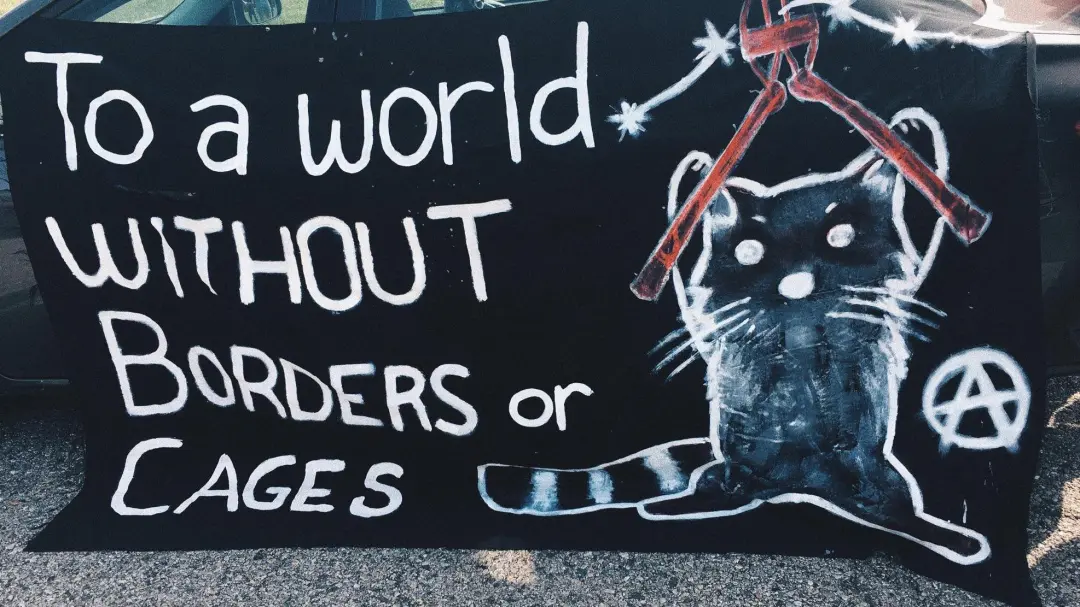Filed under: Action, Incarceration, Midwest, White Supremacy

Reportback from Michigan Abolition and Prisoner Solidarity (MAPS) on recent #ShutEmDown2021 actions in so-called Michigan.
Jailhouse Lawyers Speak, a nationwide collective of imprisoned freedom fighters, called for mass mobilization against the racist and violent prison system throughout the months of August and September 2021. In response to this call, Michigan Abolition and Prisoner Solidarity (MAPS) planned for a day of public “noise demonstrations” outside prisons around the state on September 4, 2021.
This call to action converged on three historic dates. On August 21, 1971, freedom fighter George Jackson was shot to death while allegedly attempting to escape from San Quentin Prison in California. George Jackson’s legacy continues to fan the flame of struggle against white supremacy, the colonizer state, and capitalism. His brutal assassination helped spark the mass rebellion at Attica State Prison in New York State on September 9, 1971, where the courage and resolve of prison rebels revealed the brutality of prisons to the public eye and gave shape to the modern prisoner rights movement.
Responding to a call from @JailLawSpeak, abolitionists took to the streets outside of detention centers, local jails + prisons to call for abolition, support local struggles + re-energize movements after months of repression. Our #ShutEmDown2021 roundup. https://t.co/A1sD1x8ETg pic.twitter.com/qENkOsYd6i
— It's Going Down (@IGD_News) August 25, 2021
On September 9 and 10, 2016—45 years after the Attica rebellion—prisoners at Kinross in Michigan’s Upper Peninsula participated in a collective uprising against overcrowding, rotting food, and racist treatment by an overwhelmingly white prison staff. In one of the largest prison rebellions in recent times, food workers refused to go to the kitchen and hundreds marched together in the yard with chants of “Black Lives Matter!” and “No Justice, No Peace!” In retaliation, guards and state police attacked and brutalized the protestors, sparking a mass riot. Hundreds of prisoners were shipped to solitary confinement units around the state; some remained in “the hole” for over a year in punishment for their courage.
In Washtenaw County, participants gathered at a park to share the history and significance of Black August, the 50th anniversary of the Attica Uprising, as well as to commemorate 5 years since the Kinross Rebellion. We listened to a formerly incarcerated comrade talk about how the MDOC has changed—not for the better—over the last forty years, and we listened to an audio recording of a comrade incarcerated at WHV discussing the scabies outbreak of 2019. A comrade from MAPS presented a new zine titled “The Pandemic Inside: COVID-19 in Michigan Prisons,” featuring writings from prisoners over the past year documenting their experiences and struggles during the pandemic. Finally, a comrade from Cosecha Washtenaw spoke about migrant detention centers in Michigan and the importance of solidarity in the struggle for abolition.
From noise demos, banner drops + direct actions, people took to the streets to commemorate the 50th anniversary of the #Attica prison uprising + stand in solidarity with the call to #ShutEmDown201 from @JailLawSpeak. Here's our roundup. https://t.co/A2xNgzmJ4e
— It's Going Down (@IGD_News) September 13, 2021
From there, participants formed a caravan of about 15 cars, including a van with a soundsystem attached to the roof, and rolled slowly and repeatedly past two important facilities: the Women’s Huron Valley Correctional Facility (WHV), the State of Michigan’s only women’s prison, and the Federal Correctional Institution at Milan, which holds migrants among its incarcerated population. The action was timed to coincide with prisoners at WHV being in the yard, and it worked out exactly as planned—we could see the prisoners from the road, and the noise from the caravan, including honking, shouting, and a playlist of requested songs, was impossible to miss. Prisoners shouted and waved back at us, until guards shut down the yard and forced them back inside. While we couldn’t see any prisoners at FCI Milan from the road, it would have been hard for the sound not to have carried.
After the action, we heard back from someone at WHV:
To all attendees: Some of you may know me and some may not, but let me take a moment to thank you all for the things you do I know about and especially those things we are unaware of. To you… I have a face, a name, a past, and a future. I and the rest of us aren’t simply a number, locked away, and easily forgotten. So thank you for making us impossible to forget. As well, I will never forget all of you.
Meanwhile, another car caravan was rolling noisily through Jackson, which was chosen because of its position at the center of Michigan’s carceral geography—a position it has held for more than a hundred years. Today, the Charles Egeler Reception and Guidance Center is the entry point through which all Michigan prisoners have to pass before being transferred to more permanent facilities. It is also the prison with the third-highest COVID-19 infection rate in the country. More generally, Jackson is home to three additional prisons—Cooper Street Correctional Facility, Parnall Correctional Facility, G. Robert Cotton Correctional Facility—plus a county jail and a juvenile detention center. The caravan hit up every one of these sites on its loop. At Cooper Street, prisoners were in the yard as the caravan came by and shouted in solidarity. While we at MAPS have not heard any updates from comrades or acquaintances at any of these facilities, we hope that the car caravan on September 4 kept the memory of Kinross, Attica, and even last year’s rebellions alive.
We’ll be back next year, and every year, until the prison walls fall. If you’re interested in getting more involved in abolitionist work like this, you can check out the websites of MAPS and Cosecha. You can also sign up to receive text updates from MAPS by texting @mapsac to 81010 and signing up as a “student.” And please download and share the new MAPS zine, “The Pandemic Inside: COVID-19 in Michigan Prisons.”





